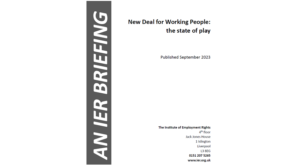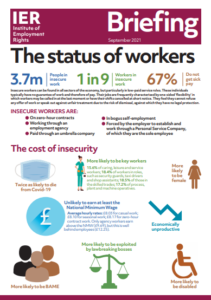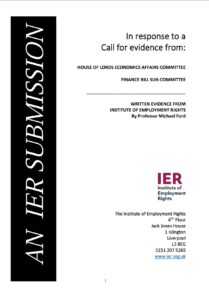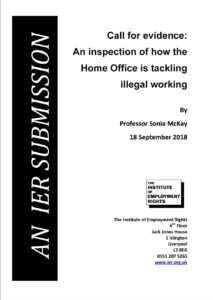
Status of Workers Bill
A Bill to abolish the exploitation of casual labour to avoid tax and employment law obligations.
The Status of Workers Bill was introduced to the House of Lords on 24 May 2021 by Lord John Hendy QC, Chair of the Institute of Employment Rights. It will have its second reading on 10 September 2021.
The Bill replaces the UK’s overcomplicated employment status system with a universal status of ‘worker’ to provide all people in employment with the same rights and protections at work.
Quiz: What do you know about insecure work?

#1. What proportion of the workforce is insecurely employed?
3.7 million people – 1 in 9 workers – are in insecure work, defined as work that offers no guarantee of hours or pay.

#2. How many insecure workers get sick pay?
Two-thirds (67%) of insecure workers do not get sick pay. This was especially dangerous during the Covid-19 pandemic when many insecure workers reported that they could not afford – or were too afraid – to take sick leave when they had symptoms of the virus or had been told to self-isolate.

#3. How much notice does an employer have to give when dismissing insecure workers?
Insecure workers have no right to claim unfair dismissal. Their employer may simply never offer them another shift!

#4. What is the average hourly pay of a zero-hours contract worker?
Zero-hour contract workers earn an average of £8.17 per hour, well below the minimum wage for adults of £8.72.
The other potential answers to this question related to different forms of insecure work.
Casual workers get just £8.03
Seasonal workers get just £8.10
Agency workers are the only type of insecure worker who, on average, get paid above the National Minimum Wage at £9.69. However, this still falls well below the average for employees at £12.25.

#5. How much notice does an employer have to give an insecure worker of their hours of work?
Because people in insecure employment are not guaranteed any work at all, they can be called in at the last minute. In fact, over one in 10 insecure workers say they get less than 24 hours’ notice as to their hours of work. They might also have their shifts cancelled at short notice. Most are too afraid to turn down a shift in case they are never offered one again.
Insecure workers report that having to drop everything to rush to work at short notice has cost them money on transport and childcare that would have been more affordable if they were able to plan ahead.

#6. Which of these groups is disproportionately likely to be insecurely employed?
Select all that apply:
All of these groups are more vulnerable to exploitation through insecure work than their white, male, able-bodied peers. The key workers that have been celebrated throughout the pandemic are also at increased risk of exploitative conditions and very low pay through insecure work.

#7. Which of these are dangers associated with insecure work?
Select all that apply:
All of these risks apply more to insecure workers than the securely employed.
Covid-19 fatalities have been two times higher among insecure workers because they have been more likely to fight the virus on the frontlines.
Pregnant women do not have the right to time off for antenatal appointments – a significant risk factor for both mother and child. All insecure workers have lesser protections against unsafe working conditions.
What’s more, many landlords refuse to let property to people in insecure employment due to their fluctuating wages and therefore the risk they may struggle to pay rent every month.
Results
You got all the answers right!
Clearly you’re an expert on insecure work, but unfortunately a lot of people do not realise just how vulnerable they are to exploitation under the UK’s current employment status system.
Share this quiz on social media to spread the word about this issue!
You didn’t quite get every answer right, but don’t worry – most don’t.
Unfortunately a lot of people do not realise just how vulnerable they are to exploitation under the UK’s current employment status system.
Share this quiz on social media to spread the word about this issue!
What is employment status?
In the UK, your relationship with your employer can be legally defined in one of two ways:
- Employee – a traditional working relationship, with a contract, regular hours or shifts, and a guaranteed wage.
- Limb (b) worker – a casualised form of labour in which there is no guarantee of regular hours or pay. This includes most workers on zero-hour contracts and working in the gig economy, as well as some agency workers.
There is also a third category of employment, which is self-employment. Genuinely self-employed people run their own business on their own account with their own clients and customers.
Workers are entitled to different rights and protections depending on their employment status.
While employees are eligible for all workers’ rights (after relevant qualifying periods), limb (b) workers have only basic rights such as to rest breaks, holiday pay and the National Minimum Wage. Self-employed people have no workers’ rights.
Crucially, limb (b) workers have no right to claim unfair dismissal and have no legal protection in the case of redundancy. This makes them easy to hire and fire, leaving them in a chronic state of job insecurity and vulnerable to exploitation from employers.
Types of insecure work
Insecure workers are:
- On zero-hour contracts
- Agency workers
- In bogus self-employment
- Paid through an umbrella company
- Forced by their employer to set up a Personal Service Company under which they are the sole employee (thereby becoming responsible for meeting their own employment rights!)
This three-tiered employment status system has been widely criticised for being unclear and open to abuse. There is much confusion among workers, employers, and even the courts, over the employment status of some kinds of worker.
The Status of Workers Bill replaces this overcomplicated employment status system with a universal status of ‘worker’ that applies to everybody except for the genuinely self-employed.
How the current system fails workers
-
Competition based on exploitation
Unscrupulous employers staff their operations with limb (b) workers rather than employees to drive down the cost of running their
businesses and avoid their obligations to their workforce. This means they can compete with their rivals on the price of their products and services, pressuring competitors to adopt similar practices, and creating a race to the bottom on employment rights across their industry.One high-profile example is that of Sports Direct’s Shirebrook warehouse, where a Parliamentary inquiry found that the – mostly agency – workers were punished for taking breaks to drink water and sacked for getting ill. The MPs’ final report concluded that the firm’s business model relied on using insecure workers to drive down costs.
-
Miscategorisation of workers to avoid the enforcement of the law
Some employers, especially in the ‘gig economy’, mislead ‘limb (b) workers’ into thinking they are ‘self employed’ or ’employees’ into thinking they are ‘limb (b) workers’ to prevent them from enforcing their entitlement to employment rights. A Parliamentary inquiry discovered that several companies even inserted a clause into workers’ contracts prohibiting staff from challenging their employment status at tribunal. While in reality this clause is entirely unenforceable, the intention was clear – to threaten and manipulate the workforce into accepting unlawful working conditions.
An individual’s employment status is not defined by the employer, or even by a written contract, but rather by the reality of the working relationship. If a court finds that a person who has been told they are on a zero-hours contract in fact has an ’employee’ relationship with their employer, they are entitled to additional rights such as protections against unfair dismissal and redundancy. Similarly, a person told they are self-employed may actually be a ‘limb (b) worker’. This was the case for Uber drivers, who were ruled ‘limb (b) workers’ after a four-year legal battle that was concluded in the Supreme Court. Unionised workers may be able to challenge their employment status in this way, but it is an expensive and lengthy process.
-
A drain on the public purse
Insecure workers pay less in tax, their employers pay less in tax, and the fact precarious workers are typically low paid means they are significantly more likely to rely on State benefits to meet their living costs. The TUC recently estimated that the cost to the Treasury of allowing insecure work to thrive in the UK economy is costing the Treasury £4bn every year.
Further, with less disposable income, the wages of insecure workers fail to stimulate demand for products and services, stalling the growth of the economy. Due to their high turnover and difficulty accessing training, it is also argued that insecure work is less economically productive.
The Status of Workers Bill will flip the presumption so that it is for the employer to prove their contractors are self-employed, rather than for workers to prove they are not self-employed. This will make it much more difficult for employers to mislead their workforce.
Times of economic hardship and recession are known to accelerate the growth of precarious work and the impact of the Coronavirus pandemic is no exception. Without urgent action, we can expect to see even more workers in the extraordinary position of never knowing when they will be working or how much they will earn, still less how much they will be paid (or when) if they do work.
The story so far…
2016 – The Institute of Employment Rights brings together 26 employment law experts to develop a Manifesto for Labour Law. One of their key recommendations is for a universal status of worker.
2016 – The Labour Party adopts the Manifesto for Labour Law as a ‘blueprint’ for its workers’ rights policy.
2017-2019 – A universal status of worker is pledged in two Labour Party General Election manifestos.
24 May 2021 – The Status of Workers Bill has its first reading in the House of Lords, introduced by Lord John Hendy QC.
July 2021 – The Labour Party announces its policy to create a universal status of worker.
10 September 2021 – The Status of Workers Bill has its second reading in the House of Lords.
Everyone deserves security at work. This is why Labour has committed to creating a single status of 'worker' for everyone but the genuinely self-employed, removing qualifying periods for basic protections to give workers rights in their job from day one.














